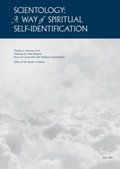Understanding the Absolute is at the centre of many theological systems. To discuss this subject, not only the written word must be relied upon but also spoken testimonies.
Examining some of the features of the Scientology concept of the Absolute, we compare them to the firm notions of the Absolute which take shape in other theological systems.
IV.I. Personal or Impersonal Existence
The higher existence, or Absolute, is impersonal in nature, a condition of the existence of both the personal spiritual being and of those creations which emerge as a result of the creative game played by the omnipotent and eternal self.
IV.II. Continuity or Discontinuity of Behaviour Between Physical Universe (MEST) and Spiritual Being
Although this problem is not raised in its general form and as such is of no interest for spiritual practice, it should be recognised with high probability that the relations between creator and the created world (composed of Matter, Energy, Space and Time, which forms the acronym MEST) are interrupted; i.e., between them there does not exist a gradual continuous transition. As for the Absolute (to the degree this abstract, from the practical angle, issue is of interest) it is viewed as an immanent essence, which can be achieved by the Spiritual Being and is the result which awaits any person who walks the personal path on the Bridge to Total Freedom.
IV.III. The Problem of Revelation in Scientology
Revelation is given in Scientology once and completely by the personality, life and texts of L. Ron Hubbard. Therefore, the task of the members of the church is to study and apply the message of Hubbard. Here is the basis for the continual references to statements and texts of Hubbard. The function and the role of the Hubbard texts in the sermon, in the service and the daily practice of the ministers and attendants of the church is the role of Revelation.
IV.IV. Verbal and Non-Verbal Understanding of the Absolute
For Scientology, the non-verbal understanding of the Absolute is typical, for the apophatic theology. The apophatic understanding of the Absolute is connected with the formal practical character of the Scientology spiritual tradition which lays out how to attain it rather than describing it. The journey to higher states of consciousness—which is austere in form—is unique to the apophatic theology. Typical for the apophatic theology is the presumption of the basic impossibility of describing in words the higher states of consciousness. Moreover, it is supposed that words only distort the experience of the Absolute. Scientology is a classical example of an apophatic religious system.
Michael A. Sivertsev, Ph.D.
Moscow
July 1995




























